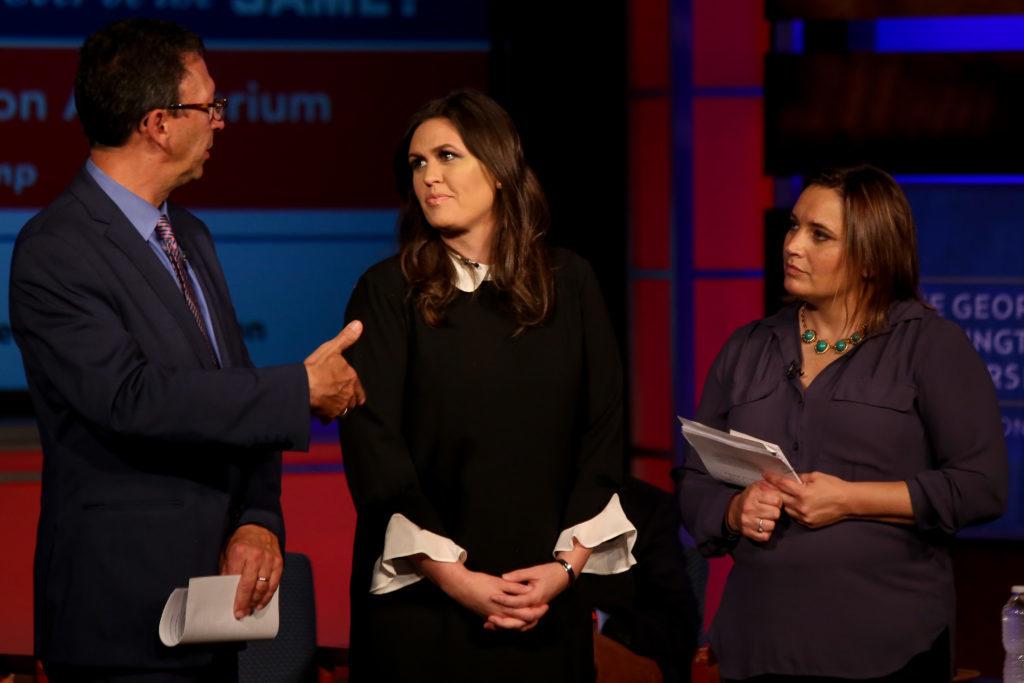White House Press Secretary Sarah Huckabee Sanders joined a panel of White House correspondents and professors to discuss President Donald Trump’s first year in office in front of a full house in Jack Morton Auditorium Monday night.
The group discussed the importance of civil discourse and the limits of press access in the Trump era. Panelists from the media said they would like to see more transparency and organization from the White House, while Sanders said she wanted to see more policy-oriented journalism from the press.
The panel also featured New York Times reporter Glenn Thrush, Yahoo News White House correspondent Olivier Knox and American Urban Radio Networks’ April Ryan. SMPA director Frank Sesno and the President of the White House Correspondents’ Association Margaret Talev moderated the event.
Here are some takeaways from the conversation:
1. Covering Trump
Sanders said Trump has been the disruptive candidate he promised to be and has been more successful in achieving his goals than Congress has. Sanders said she hasn’t seen enough policy-related journalism from the press on Trump’s improvements to the economy and unemployment rates in his tenure.
“They were looking for somebody to come in and change Washington and change the status quo, shake things up and he’s certainly done that,” she said.
But when asked about anonymous sourcing, Sanders said the White House communications office is working to ensure administration sources are available for more on-the-record meetings with journalists.
“We had a meeting today in our office to push for things that come from the administration, particularly from the press office, to be on the record,” she said. “Because I think it’s hard for us to argue that we want you guys to have on-record sources if we’re not going on the record.”
2. Continuing civil discourse
Sesno and Talev both said that GW and the WHCA still place value on civil discourse, even though it is under attack.
“I think one of the things we have seen that is most under siege in this country is the notion of civil discourse, and we here at GW among other things very much want to stand for that,” Sesno said.
Sesno said the journalists and the press secretary’s relationship is set up a certain way because of accountability issues. He said the press secretary should hold the media accountable, and the media should do the same.
“I think we can also look for you to have this respectful but adversarial relationship,” he said.
Ryan told Sanders that she felt their relationship was to be “friendly” adversaries and that Sanders “took no prisoners” in the briefing room. Sanders took over the role as press secretary in July after former White House Press Secretary Sean Spicer stepped down.
“When Sean left, you picked up that mantle, and you charged right in,” she said.
But Ryan said the White House press corps could use more organization and less chaos from the administration.
3. ‘Learning on the job’
Thrush said there have been errors in communication from the Trump administration and it was clear that Trump and his staff were “learning on the job.” Thrush used the example of Trump’s recent remarks on Twitter about Congresswoman Frederica Wilson’s character as an instance where communication could have improved.
John Roberts, the White House Correspondent for Fox News, said the GOP has to figure out how to get things done while controlling both the House of Representatives and the Senate. Congress has struggled in its attempts to repeal and replace Obamacare and pass other legislation, and Trump can’t count on his own party or the opposition, he said.
“If he reaches out to the Democrats, I think he has to be realistic in that he might get some things done, but the Democrats will stick the knife in his back the moment they get the opportunity to on different issues,” Roberts said.





